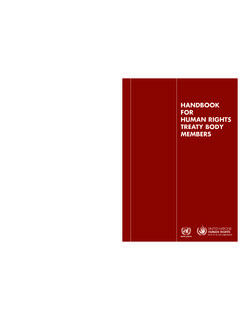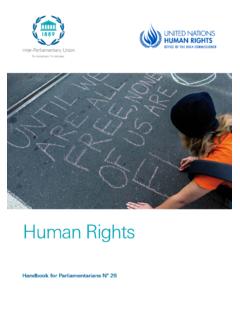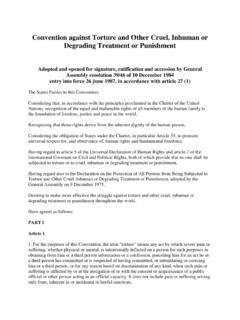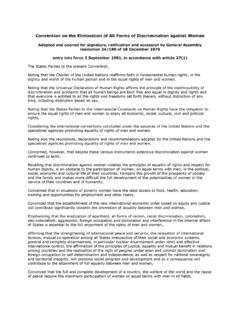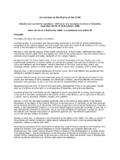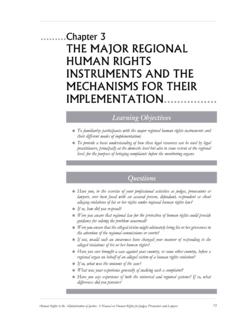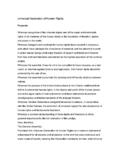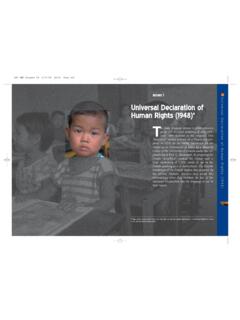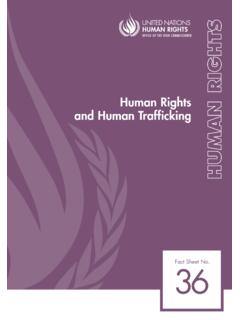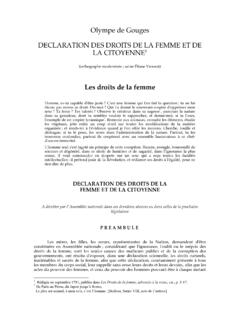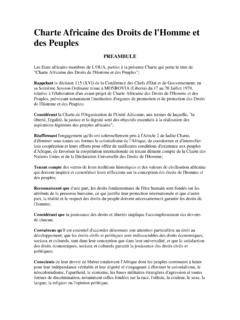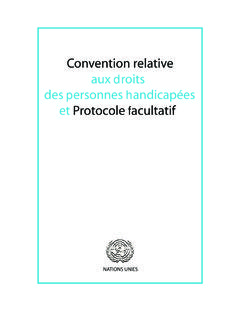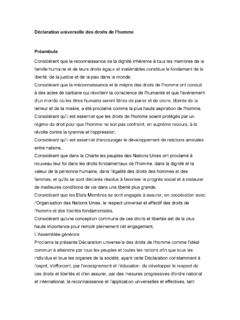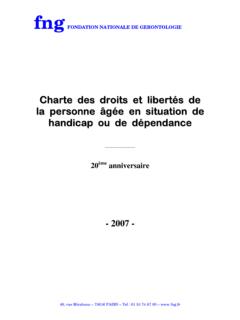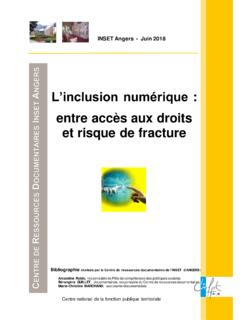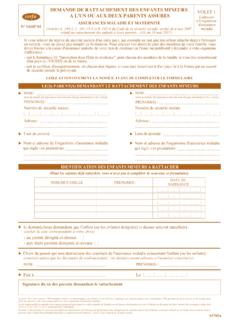Transcription of Human Rights, Terrorism and Counter-terrorism
1 Office of the United Nations High Commissioner for Human RightsHuman rights , Terrorism and counter -terrorismFact Sheet No. 32iiNOTEThe designations employed and the presentation of the material in this publication do not imply the expression of any opinion whatsoever on the part of the Secretariat of the United Nations concerning the legal status of any country, territory, city or area, or of its authorities, or concerning the delimitation of its frontiers or contained in this publication may be freely quoted or reprinted, provided credit is given and a copy of the publication containing the reprinted material is sent to the Office of the United Nations High Commissioner for Human rights , Palais des Nations, 8-14 avenue de la Paix, CH-1211 Geneva 10.
2 ,. ,. :. The promotion and protection of Human rights for all and the rule of law is essential to all components of the Strategy, recognizing that effective Counter-terrorism measures and the promotion of Human rights are not conflicting goals, but complementary and mutually reinforcing United Nations Global Counter-terrorism Strategy (General Assembly resolution 60/288, annex)1 INTROdUCTIONThe Human cost of Terrorism has been felt in virtually every corner of the globe. The United Nations family has itself suffered tragic Human loss as a result of violent terrorist acts. The attack on its offices in Baghdad on 19 August 2003 claimed the lives of the Special Representative of the Secretary-General, Sergio Vieira de Mello, and 21 other men and women, and injured over 150 others, some very seriously.
3 Terrorism clearly has a very real and direct impact on Human rights , with devastating consequences for the enjoyment of the right to life, liberty and physical integrity of victims. In addition to these individual costs, Terrorism can destabilize Governments, undermine civil society, jeopardize peace and security, and threaten social and economic development. All of these also have a real impact on the enjoyment of Human of the individual is a basic Human right and the protection of individuals is, accordingly, a fundamental obligation of Government. States therefore have an obligation to ensure the Human rights of their nationals and others by taking positive measures to protect them against the threat of terrorist acts and bringing the perpetrators of such acts to recent years, however, the measures adopted by States to counter Terrorism have themselves often posed serious challenges to Human rights and the rule of law.
4 Some States have engaged in torture and other ill-treatment to counter Terrorism , while the legal and practical safeguards available to prevent torture, such as regular and independent monitoring of detention centres, have often been disregarded. Other States have returned persons suspected of engaging in terrorist activities to countries where they face a real risk of torture or other serious Human rights abuse, thereby violating the international legal obligation of non-refoulement. The independence of the judiciary has been undermined, in some places, while the use of exceptional courts to try civilians has had an impact on the effectiveness of regular court systems. Repressive measures have been used to stifle the voices of Human rights defenders, journalists, minorities, indigenous groups and civil society.
5 Resources normally allocated to social programmes and development assistance have been diverted to the security sector, affecting the economic, social and cultural rights of practices, particularly when taken together, have a corrosive effect on the rule of law, good governance and Human rights . They are also counterproductive to national and international efforts to combat for Human rights and the rule of law must be the bedrock of the global fight against Terrorism . This requires the development of national Counter-terrorism strategies that seek to prevent acts of Terrorism , prosecute those responsible for such criminal acts, and promote and protect Human rights and the rule of law.
6 It implies measures to address the conditions conducive to the spread of Terrorism , including the lack of rule of law and violations of Human rights , ethnic, national and religious discrimination, political exclusion, and socio-economic marginalization; to foster the active participation and leadership of civil society; to condemn Human rights violations, prohibit them in national law, promptly investigate and prosecute them, and prevent them; and to give due attention to the rights of victims of Human rights violations, for instance through restitution and Fact Sheet has been prepared with the aim of strengthening understanding of the complex and multifaceted relationship between Human rights and Terrorism .
7 It identifies some of the critical Human rights issues raised in the context of Terrorism and highlights the relevant Human rights principles and standards which must be respected at all times and in particular in the context of is addressed to State authorities, national and international non-governmental organizations (NGOs), national Human rights institutions, legal practitioners and individuals concerned with ensuring the protection and promotion of Human rights in the context of Terrorism and , the Fact Sheet is intended to: Raise awareness of the impact of Terrorism and Counter-terrorism on the enjoyment of all Human rights ; Provide a practical tool for practitioners dealing with Terrorism , Counter-terrorism measures and Human rights ; Provide guidance on ensuring compliance with Human rights when countering Terrorism ; Illustrate specific Human rights challenges in countering Human rights ANd TERRORISMThis chapter sets out the Human rights framework before examining the impact that Terrorism has on Human rights .
8 It then addresses the relation- ship between Terrorism , Human rights and other relevant international legal What are Human rights ?1. The nature of Human rightsHuman rights are universal values and legal guarantees that protect individuals and groups against actions and omissions primarily by State agents that interfere with fundamental freedoms, entitlements and Human dignity. The full spectrum of Human rights involves respect for, and protection and fulfilment of, civil, cultural, economic, political and social rights , as well as the right to development. Human rights are uni- versal in other words, they belong inherently to all Human beings and are interdependent and International Human rights lawInternational Human rights law is reflected in a number of core international Human rights treaties and in customary international treaties include in particular the International Covenant on Economic, Social and Cultural rights , and the International Covenant on Civil and Political rights and its two Optional Protocols.
9 Other core universal Human rights treaties are the International Convention on the Elimination of All Forms of Racial Discrimination; the Convention on the Elimination of All Forms of Discrimination against Women and its Optional Protocol; the Convention against Torture and other Cruel, Inhuman or Degrading Treatment or Punishment and its Optional Protocol; the Convention on the rights of the Child and its two Optional Protocols; and the International Convention on the Protection of the rights of All Migrant Workers and Members of Their Families. The most recent are the International Convention for the Protection of All Persons from Enforced Disappearance, and the Convention on the rights of Persons with Disabilities and its Optional Protocol, which were all adopted in December 2006.
10 There is a growing body of subject-specific treaties and protocols as well as various regional treaties on the protection of Human rights and fundamental Human rights law is not limited to the enumeration of rights within treaties, but also includes rights and freedoms that have become part of customary international law, which means that they bind all States even if they are not party to a particular treaty. Many of the rights set out in the Universal Declaration of Human rights are widely regarded to hold this character. The Human rights Committee has similarly observed, in its general comments N 24 (1994) and N 29 (2001), that some rights in the International Covenant on Civil and Political rights reflect norms of customary international law.
